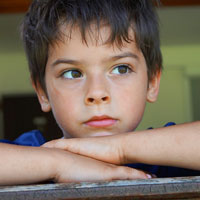Children Experiencing Grief from Loss or Separation
Grief is the natural response to loosing someone or something that is important to you. Normally family, friends, school and community networks support children to deal with death and loss in their own ways and in their own time.
How children grieve
 It is important to understand that Children often express their grief differently to adults in that they tend to grieve in bursts because they they can't tolerate grief for long periods of time. They go in and out of grief and may be coping well when something will trigger a disproportional response and it all comes out in an emotional outburst.
It is important to understand that Children often express their grief differently to adults in that they tend to grieve in bursts because they they can't tolerate grief for long periods of time. They go in and out of grief and may be coping well when something will trigger a disproportional response and it all comes out in an emotional outburst.
Children's grief can be expressed in a wide range of emotions and behaviours including regression, withdrawal, anger, fears and anxieties, insecurity, sadness, behaviour difficulties, confusion and depression. Children will often be unable to verbalise their grief and may show their feelings through their behaviour and play. Grief in children does not usually happen in nice, neat stages and is influenced by the child's age, developmental level, maturity, temperament, level of support from family members and their relationship to the lost person.
Seeking help
So when does a grieving child need professional help?
- If a child becomes preoccupied with the loss
- A child or young person who talks of not wanting to live and any self destructive behaviours
- Excessive anger, sadness or depression
- Social withdrawal and lack of interest in friends, school and activities
- Persistent anxiety or yearning for the lost person that interferes with normal everyday functioning
- Self blame or guilt about the death
Quick tips
Always try to give children accurate, honest information about the loss that has occurred, making sure it is age appropriate for that particular child. Always be aware that children may not be showing grief on the outside but they will be grieving on the inside in their own particular way. Remember children are masters of distraction and have the ability to focus on other things.
